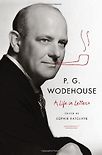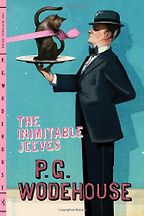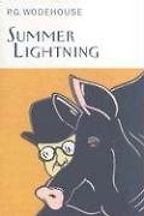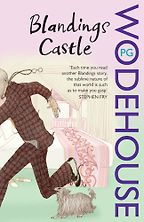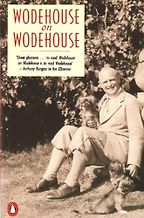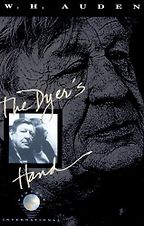Before we look at the books you’ve chosen, can you give us a thumbnail sketch of P G Wodehouse?
Pelham Grenville – he was known to his friends as “Plum” – was born a Victorian and became one of the 20th century’s great comic writers. He is still much read and much loved. He produced a phenomenal amount of novels, short stories and plays. He wrote for musicals as well, which some people may not realise. Biographically, he’s very interesting. He desperately wanted to live a quiet life and get on with writing, but for complicated reasons became swept up in some of the most dramatic events of the century.
What got you interested in him?
I first read Wodehouse when I was 14. I was always climbing up my parents’ bookshelves and looking for something interesting or something forbidden, and I found a little orange Penguin called The Inimitable Jeeves. I took it outside and I thought I’d discovered the most magical world. I felt like it was entirely my discovery. I went inside and asked my mother, “What is this book?” She said, “Oh it was your father’s.” My father had died the year before, so reading Wodehouse became, I suppose, a sort of connection with him. Later on the Wodehouse estate were looking for someone to edit his letters, and I was able to get to know him even better through doing that.
What kinds of thing did that collection of his letters show you about him as a person?
Some of the letters that moved me most were the ones he wrote as a schoolboy. In those you really see the joking ambition of him. He writes that his sudden realisation of the death of Shakespeare “steeped me in profound gloom. But I thought eftsoons that I was alive so it was all right for the Literature of the World.” They’re full of burning desire and scheming and trying to impress. In his letters he is always taking on different roles to try and entertain people according to the correspondent. But he’s also quite insecure. He was friends with Arthur Conan Doyle but not as friendly as he would like to be, so his letters to Doyle are particularly carefully crafted, with a little bit of a swagger about them.
“One of the reasons Wodehouse was so driven is because he couldn’t go to Oxford, because his father didn’t have enough money.”
The letters show how incredibly hard he worked, often working on a novel, a series of short stories and a musical all at the same time – “shuttling” back and forth between London and New York on a transatlantic ocean liner. They show his blindness to political events, and his obsession with sport, especially school sport. He followed his old school rugby matches with devotion. “I still think the Bedford [school] match the most important thing in the world,” he writes. The letters also show his concern with earning money, his worries about it – and his generosity. He was extremely generous and immensely kind, but rather oblivious, a bit like his own favourite character, the pig-loving Lord Emsworth, the ninth Earl of Blandings.
Tell us more about The Inimitable Jeeves, the book that introduced you to him.
It’s about a young man called Bertie Wooster and his valet, Jeeves. This is kind of a novel, but it was originally written as separate short stories which were published in magazines in the early 1920s. I chose it not only because it is the first Wodehouse book I read, but also because it is wonderful. I was particularly thinking of the hilarious first short story, about Bertie’s friend Bingo who falls desperately in love with a waitress called Mabel. The story centres on how Bingo is going to get his uncle’s permission to marry Mabel, and Jeeves devises a cunning scheme to make this possible. There’s a marvellous scene where Bertie and the lovesick Bingo end up in Mabel’s teashop. We get Bingo studying the menu “devoutly”, as if it’s a sacred text. That “devoutly” tells us a lot about Bingo’s feelings. Wodehouse has such a gift with language. The placement of the word “macaroon” in this story is magnificent.
What about Jeeves’s relationship with Bertie?
Jeeves always gets things absolutely right. He’s in charge of everything from Bertie’s choice of socks to his love-life. As Bertie puts it, he’s “so dashed competent in every respect”. And there’s a great deal of fondness between the pair, much of which goes completely unsaid.
He comes across as much more intelligent than Bertie.
Yes – though Bertie would love to be thought of as intelligent. He often tries to capture things through quotations, which he gets wrong and is gently corrected by Jeeves. In fact Jeeves once refers to Bertie as “mentally negligible”, which causes a bit of friction. But Jeeves isn’t all brain. There is a moment at the end of the second story where we find out that Jeeves has a love life, that he’s courting someone. That is what made me smile the most. When a novel is so much about surface, and then you find this moment of inwardness, it’s extraordinary. Dickens does the same thing with Mr Pickwick. I’ve also always wondered – if Jeeves is so perfect, what would he be like on a date?
Your next Wodehouse book, Summer Lightning, has a poor chorus girl for the heroine.
Summer Lightning is a detective story crossed with a romantic farce. It’s set in Blandings Castle, Wodehouse’s famous fictional country idyll. There’s lots going on. We have a pair of star-crossed lovers, a kidnapped pig, a scandalous memoir and slimy private investigator called Pilbeam. Our heroine is Sue Brown, a chorus girl. When people think of Wodehouse’s characters, most of us will think of Bertie, Jeeves or Psmith. But especially in his early writing, like Jill the Reckless or The Adventures of Sally, Wodehouse had a lot of brilliant female characters.
These women are meant to have been modelled on an unrequited love from when he was younger.
He fell in love with someone called Alice Dovey, who wasn’t a chorus girl but a famous actress with a beautiful voice. After she died, he wrote in a letter to her family that all his heroines were more or less modelled on her. But he also drew on his wife Ethel, who was originally an actress, and his step-daughter Leonora whom he adored. So resilient, brave and funny women run through a lot of his fiction.
There is also the theme, throughout his work, of needing to do what is called for because you haven’t got much money. That runs through Summer Lightning and is incredibly important to Wodehouse. I think one of the reasons Wodehouse was so driven is because he couldn’t go to Oxford, because his father didn’t have enough money. Many of his characters need money in order to be free to do what they want to do, or to marry the person they want to marry.
Despite the fact that many of them come from the British upper-middle class – so you would assume they have money.
Yes, he was interested in what he called the “knut” – an Edwardian slang term for a rather idiotic man about town who didn’t have much to do. But he also writes about what happens if the knut runs out of money – if the “family sock” runs a bit short. Also, a lot of his characters aren’t upper class at all but are struggling writers or secretaries or actresses.
Your next choice is Blandings Castle and Elsewhere.
This is a short story collection, which includes the great story “Lord Emsworth and the Girl Friend”. Kipling said that it was “the most perfect short story ever written”. But I really chose this book because it contains his stories about Hollywood. When the talkies began, Wodehouse went to LA and was paid a vast amount of money for what he thought of as doing very little. He wrote something, then someone else re-wrote it, then it was re-written again and then they decided not to do it after all. There is a wonderful story in this book called “Monkey Business”, where he captures Hollywood as a strange wonderland where no one is really what they seem. The story is all about a gorilla impersonator. There was a craze for gorilla movies in the 1930s. It’s wonderfully full of cultural details, in the same way you might find in Evelyn Waugh’s novel The Loved One.
Hollywood also features in your next choice, Wodehouse on Wodehouse.
This is a collection of three of Wodehouse’s non-fiction books. One of them, Bring on the Girls, describes Wodehouse’s time as a lyricist, and in Hollywood when he worked with [musical producers] Guy Bolton and Jerome Kern. It also contains his own autobiography, Over Seventy, in which he describes his Victorian childhood. He used to visit grand houses but was incredibly shy. He would take refuge in the servants’ hall, full of “kindly footmen and vivacious parlour maids”. The third part, Performing Flea, is a series of letters from Wodehouse to his friend Bill Townend, mostly about the craft of being a writer. The title is a joke. A journalist during the war referred to Wodehouse as “English literature’s performing flea”.
We can’t talk about Wodehouse without discussing what happened to him and his reputation during the Second World War.
This is all quite complicated, and the best account of it is given in Robert McCrum’s brilliant biography Wodehouse: A Life. Wodehouse was living in occupied France during World War II and was interned by the Nazis. He was interned in three places over the course of 18 months – he spent the longest time in Upper Silesia, now Poland. He was released and had to stay under supervision in Berlin before moving to occupied Paris. Just after he was released, the Nazis suggested that he broadcast some comic talks that he had written, in order to keep in touch with his fans in America. Wodehouse didn’t realise that the medium was the message – that in broadcasting on German radio, he was being framed to look like a Nazi sympathiser. It was, he said, “a ghastly blunder”, and although he was cleared of any charges of collaboration it cast a shadow over his reputation. In the letters from this period it’s very interesting – and distressing – to see this through Wodehouse’s eyes, against the background of wartime Berlin and Paris.
Finally, you have chosen The Dyer’s Hand by WH Auden.
This is a collection of critical essays written in the fifties. Two of them discuss Wodehouse, quite briefly, but in beautiful ways. I’ll probably be accused of being like Wodehouse’s Florence Craye for including it – “steeped to the gills in serious purpose”. But it’s worth including because it’s one of the very few attempts to write about why humour like Wodehouse’s matters. A critic once said these are “serious essays against high seriousness”.
One of those two stories, “Balaam and His Ass”, is about the comic master-servant relationship and why there is a beauty to it. The other, “Dingley Dell and the Fleet” talks about Wodehouse as an “expert on Eden”. Auden describes why characters can live on beyond and outside their novels, and why innocence matters – which strikes me as rather fascinating and important, if we are going to think about why Wodehouse has had such appeal to such a wide range of people, including Wittgenstein, Salman Rushdie and the late Queen Mother.
Why do you think that is?
As Auden says, characters like this just seem to endure. The red-faced Aunt Dahlia who is “built rather on the lines of Mae West” and sends Bertie epic telegrams. Aunt Agatha, the “nephew-crusher” who “chews broken bottles and kills rats with her teeth”. The “amiable and boneheaded” Lord Emsworth, “drooping like a wet sock”. The “immaculate” Psmith, lounging in the Drones club. The list goes on.
Get the weekly Five Books newsletter
It’s the quality of his style and his jokes. For instance, “She came leaping towards me like Lady Macbeth coming to get first hand news from the guest room.” Or, “[He] clasped her to his bosom, using the interlocking grip”. Or, “She looked like a tomato struggling for self-expression.” But even in quoting you miss something. You need them within the structure and rhythm of the stories themselves. He worked and worked at his plots. The details came easily to him, and that was the sort of writing that he enjoyed, but the plotting was more difficult. He was always asking his friends for ideas about how to plot. But the work paid off. He also writes very good love stories. So I think it’s his exceptional style, and the sheer joy of stories which offer a world where things come right. They give us a little glimpse of Eden.
Five Books aims to keep its book recommendations and interviews up to date. If you are the interviewee and would like to update your choice of books (or even just what you say about them) please email us at [email protected]
Five Books interviews are expensive to produce. If you've enjoyed this interview, please support us by donating a small amount.

